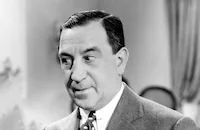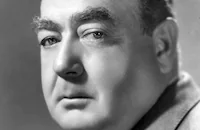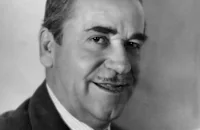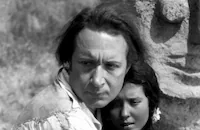A Little Bit of Heaven
Cast & Crew
Andrew Marton
Gloria Jean
Robert Stack
Hugh Herbert
C. Aubrey Smith
Stuart Erwin
Film Details
Technical Specs

Synopsis
Midge Loring and her large extended family of "uncles" live in a Tenth Avenue tenement, where Midge's kindness and consideration toward her friends creates a little bit of heaven amid the squalor. Her family's life changes drastically when Midge's golden voice is discovered after she appears on a sidewalk radio broadcast and she is offered a recording contract. While her uncles remain in the slums, Midge and her immediate family are swept uptown into a life of luxury. Their sudden wealth causes all but Midge and Grandpa to lose sight of the important values in life, and even Midge's sister Janet foresakes Bob Terry, her old beau, in favor of a social climber. When her old friends from the tenements are excluded from a swank party in honor of Midge's birthday, Midge pretends to lose her voice prior to her big concert performance, sending her family back to the tenements humbled and seeking the comfort of their old friends. Midge's plan backfires, however, when Herrington, the owner of the radio station, angrily cancels her appearance and replaces her with the portly Madame Alma Lupinsky. A tearful Midge visits her old singing teacher Tony and after listening to her story, Tony rallies her uncles to waylay Madame Lupinsky and Herrington on the night of the concert. In Madame Lupinsky's absence, Midge steps up to the microphone and brings a little bit of heaven to her audience.

Director

Andrew Marton
Cast

Gloria Jean

Robert Stack

Hugh Herbert

C. Aubrey Smith

Stuart Erwin
Nan Grey

Eugene Pallette

Billy Gilbert
Butch And Buddy

Nana Bryant
Tommy Bond
Charles Previn
Kitty O'neil
Helen Brown

Sig Arno

Rafaela Ottiano
Chester Clute
Renie Riano
Frank Jenks

Noah Beery Sr.
Maurice Costello
Charles Ray
Fred Kelsey

Monte Blue
Tom Dugan
William Desmond
Edgar Deering
Kenneth Harlan
Pat O'malley
David Oliver
Gene Collins
Bobby Barber
Jack Voglin
Abner Wilder
Mickey Daniels
Norman Dobrin
Charles Murphy
John Holmes
Mary Shannon
Grace Cunard
William Alston

Charles Lane
Ian Maclaren
Mrs. Gardner Crane
Herbert Evans
Bob Mckenzie
Cyril Thornton
Crew
Islin Auster
Ernest R. Ball
Laslo Benedek
J. Keirn Brennan
Bernard B. Brown
Charles Carroll
Vivian Ellis
Fred Frank
Ralph Freed
R. A. Gausman
Harold Goldman
Harold Goldman
Sam Lerner
Jack Otterson
Joe Pasternak
Charles Previn
Charles Previn
Gertrude Purcell
Richard H. Riedel
John Seitz
Frank Skinner
Frank Skinner
Daniel Taradash
George Thomas Jr.
Vera West

Film Details
Technical Specs

Articles
Robert Stack, 1919-2003
Stack was born in Los Angeles on January 13, 1919 to a well-to-do family but his parents divorced when he was a year old. At age three, he moved with his mother to Paris, where she studied singing. They returned to Los Angeles when he was seven, by then French was his native language and was not taught English until he started schooling.
Naturally athletic, Stack was still in high school when he became a national skeet-shooting champion and top-flight polo player. He soon was giving lessons on shooting to such top Hollywood luminaries as Clark Gable and Carol Lombard, and found himself on the polo field with some notable movie moguls like Darryl Zanuck and Walter Wanger.
Stack enrolled in the University of Southern California, where he took some drama courses, and was on the Polo team, but it wasn't long before some influential people in the film industry took notice of his classic good looks, and lithe physique. Soon, his Hollywood connections got him on a film set at Paramount, a screen test, and eventually, his first lead in a picture, opposite Deanna Durbin in First Love (1939). Although he was only 20, Stack's natural delivery and boyish charm made him a natural for the screen.
His range grew with some meatier parts in the next few years, especially noteworthy were his roles as the young Nazi sympathizer in Frank Borzage's chilling The Mortal Storm (1940), with James Stewart, and as the Polish flier who woos a married Carole Lombard in Ernst Lubitsch's To Be or Not to Be (1942).
After serving as a gunnery officer in the Navy during World War II, Stack returned to the screen, and found a few interesting roles over the next ten years: giving Elizabeth Taylor her first screen kiss in Robert Thorp's A Date With Judy (1948); the leading role as an American bullfighter in Budd Boetticher's The Bullfighter and the Lady (1951); and as a pilot in William Wellman's The High and the Mighty (1954), starring John Wayne. However, Stack saved his best dramatic performances for Douglas Sirk in two knockout films: as a self-destructive alcoholic in Douglas Sirk's Written on the Wind (1956), for which he received an Academy Award nomination for supporting actor; and sympathetically portraying a fallen World War I pilot ace who is forced to do barnstorming stunts for mere survival in Tarnished Angels (1958).
Despite proving his capabilities as a solid actor in these roles, front rank stardom oddly eluded Stack at this point. That all changed when Stack gave television a try. The result was the enormously popular series, The Untouchables (1959-63). This exciting crime show about the real-life Prohibition-era crime-fighter Eliot Ness and his G-men taking on the Chicago underworld was successful in its day for several reasons: its catchy theme music, florid violence (which caused quite a sensation in its day), taut narration by Walter Winchell, and of course, Stack's trademark staccato delivery and strong presence. It all proved so popular that the series ran for four years, earned an Emmy for Stack in 1960, and made him a household name.
Stack would return to television in the late '60s, with the The Name of the Game (1968-71), and a string of made-for-television movies throughout the '70s. His career perked up again when Steven Spielberg cast him in his big budget comedy 1941 (1979) as General Joe Stillwell. The film surprised many viewers as few realized Stack was willing to spoof his granite-faced stoicism, but it won him over many new fans, and his dead-pan intensity would be used to perfect comic effect the following year as Captain Rex Kramer (who can forget the sight of him beating up Hare Krishnas at the airport?) in David and Jerry Zucker's wonderful spoof of disaster flicks, Airplane! (1980).
Stack's activity would be sporadic throughout the remainder of his career, but he returned to television, as the host of enormously popular Unsolved Mysteries (1987-2002), and played himself in Lawrence Kasden's comedy-drama Mumford (1999). He is survived by his wife of 47 years, Rosemarie Bowe Stack, a former actress, and two children, Elizabeth and Charles, both of Los Angeles.
by Michael T. Toole

Robert Stack, 1919-2003
Quotes
Trivia
Notes
This picture, a sequel to The Underpup, was Gloria Jean's second collaboration with producer Joe Pasternak. Although the copyright records and a Hollywood Reporter production chart credit Grover Jones with screenplay, his name does not appear on the film or in the Screen Achievements Bulletin. A radio production of this picture, also starring Gloria Jean, was presented on the Lux Radio Theatre in December 1940.














